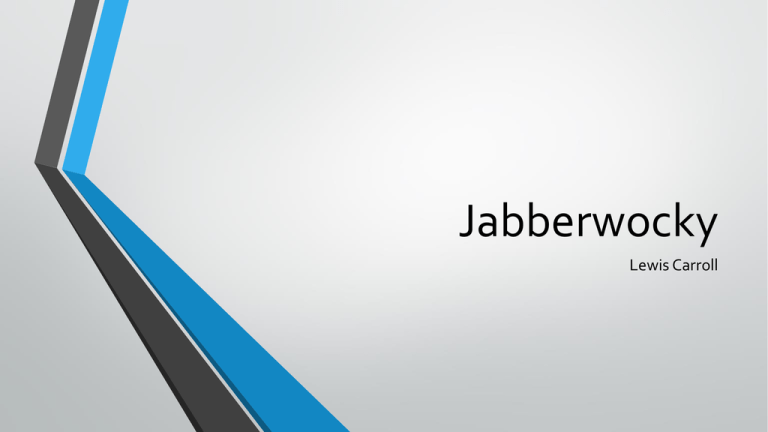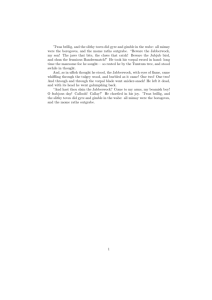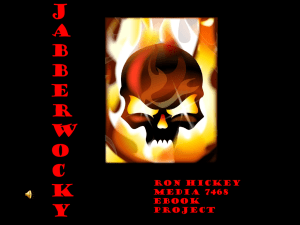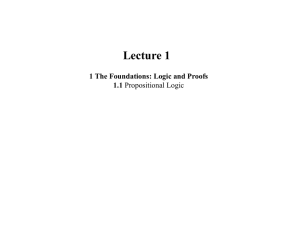Jabberwocky - WordPress.com
advertisement

Jabberwocky Lewis Carroll Lines 1-2 'Twas brillig, and the slithy toves Did gyre and gimble in the wabe; • • • • • 'Twas brillig, and the slithy toves Did gyre and gimble in the wabe; Welcome to the vocab-roller-coaster that is this detailed summary. A big part of understanding "Jabberwocky" just has to do with playing around with the language and trying to find different ways of placing the nonsense words into the rest of the poem. Let's begin. 'Twas is not a nonsense word – it's just an old contraction for the words "it was." But what about brillig? Well, we might be able to parse this by trying to figure out what it sounds like. Brillig sounds a little like…Brillo Pads. But that's probably not it. What else? How about brilliant? Maybe it's "it was brilliant," like a nice day, with warm sun. We'll go with that for now. But then we get slithy toves. Slithy sounds like slimy, maybe, or sly. And toves? A little like groves, but slimy groves? Could be – after all, we're in Wonderland. Maybe these are bizarre trees. They could also be bizarre creatures. We can't make heads or tails of it, yet.. • • • • • Now how about gyre and gimble? What do those words sound like? Well we can't help but think gyre is a lot like gyrate, which means to move around in a kind of circle. You know, like swinging your hips at a dance. And gimble? Sounds a bit like nimble, but in the context of the line, it's a verb. You can't "nimble" in anything. But you can be nimble! So maybe these trees – or creatures – are dancing nimbly around. That would give us a kind of fantasy pastoral scene (i.e., a nature passage in which everything seems more or less peaceful). This scene seems picturesque, even. Well, except for the fact that we can't quite picture anything here. And that's hard, but it's also part of the magic of the piece. These things can be, to a certain degree, whatever you want them to be, which is why it's so important to play with the language and have fun with it. What about wabe? Maybe wood. Or wave, although it doesn't seem like we are in the ocean. This might be some mystery term for the landscape, because the wabe is the place in which all this is going on. Without getting hung up on any of these made-up words, let's keep going and see if we can make sense of the poem as a whole Lines 3-4 All mimsy were the borogoves, And the mome raths outgrabe. • • • Oh dear. Mimsy? Borogoves? Mome raths? We'll go one at a time here. Mimsy sounds a little like whimsy, and since it's being used as an adjective here, maybe it means whimsical. This would make sense in context, as the whole thing is whimsical, which means "based in fantasy." Mimsy also sounds…light, like flimsy. Not weak, necessarily, but airy, perhaps. So what's mimsy modifying, then? Borogoves. Hmm. Sounds like some kind of grove, but not quite. Maybe it's another kind of tree. A tall, willowy one perhaps. Or maybe it's another creature, like a spindly bird or something. It could be any number of things. • Then mome raths. Since it's not one word, we might be able to assume that mome is an adjective and then raths is another noun. Mome looks (and sounds) like mum, which means "silent." Or it could be something more like numb. Either way, there's a quietness about it. • And raths? Another mystery – maybe rats. Or wreaths. It doesn't feel quite like a plant, however, because of the adjective mome. We think it's somewhat likely that raths are some kind of animal. • And what are these mystery creatures doing? Outgrabe-ing. Apparently. The word out is right in there, so maybe calling out? Making some kind of noise? • In any case, these two lines also hold up to a kind of ridiculous pastoral. We have animals and/or plants, doing things in a peaceful scene. We just have no real idea how to visualize any of it. Stanza 2 Summary • Lines 5-6 • "Beware the Jabberwock, my son The jaws that bite, the claws that catch! • Now we're in a different place altogether, a place with humans talking. • This transition would be refreshing if it weren't for the fact that the first word of human speech is beware. That's warning that something bad might happen. • Also, we can tell from the "my son" bit that this is a parent talking. What are we supposed to beware? The Jabberwock, of course, the title...thing…of the poem. We have no idea what a Jabberwock is at this point, but if we're to beware of it, we can be pretty sure that it's not a fluffy bunny. • And we're right – in the next line, the parent warns the son of biting jaws and grabbing claws. • So this thing is pointy, no doubt about it. Maybe a dragon-like creature? Or a horrible wolf-like thing? The parent obviously knows what it is, but we don't. Lines 7-8 • Oh no, more awful things. • Unfortunately, no one in Through the Looking-Glass has anything more to say about this poem, so we're entirely on our own for both the Jubjub bird and his friend, the Bandersnatch. • Like we said before, deciding what these creatures are, what they look like and how they behave is part of the fun. • The Jubjub bird could be anything. Anything you're most scared of. Hawks? Giant, angry ostrich? Spooky owl? All are possible. • Same with the Bandersnatch. Sounds a little like badger, but if we go with Humpty Dumpty, toves are also a little like badgers. Maybe these are bigger and fiercer than the average badger. • And frumious sounds like a combination of fuming (i.e., "smoking" or "angry") and furious. Clearly, these are creatures not to be trifled with, which is probably why the parent is taking great pains to warn the child. • Stanza 3 Summary • Get out the microscope, because we’re going through this poem line-by-line. • Lines 9-10 • He took his vorpal sword in hand; Long time the manxome foe he sought– • Now we see why there was a warning in the first place. Apparently, the son is going hunting for these creatures. Maybe they are disturbing the otherwise peaceful wood. • And what's a vorpal sword? Luckily we have the word sword to tell us that it's a weapon; vorpal is just a modifier here. But what a modifier! It's reminiscent of vortex, warp, and portal. This thing sounds almost like a light-saber. It's no ordinary sword, that's for sure. • So our hunter, the hero of the story, goes out into the wild for a long time, to seek (the past tense is sought) the horrible creatures his parent has described to him. • One last fiddly word: manxome. Sounds a little bit like a combination between noisome (i.e., "foul") and mangy. That would be about right, it would seem, for evil creatures that one wants to vanquish with a sword. • So in short: our hero takes his weapon, heads off, and spends a good long time trying to find these evil creatures. Lines 11-12 So rested he by the Tumtum tree, And stood awhile in thought. • Thankfully, these lines are starting to get a little bit easier to comprehend. • We might not know what a Tumtum tree is, but the rest of these lines are very clear. • Our hero has been seeking his foes for a while, and is now taking a break. • So he rests by the tree, and loses himself thinking for a little while. • He might be thinking about how best to find these scary beasts. Or how he might best conquer them. Or maybe just about how tired he is. • Stanza 4 Summary • Get out the microscope, because we’re going through this poem line-by-line. • Lines 13-14 • And, as in uffish thought he stood, The Jabberwock, with eyes of flame, • Here we have another clear plot point, and it happens to be the beginning of the climax of the poem: the Jabberwock itself appears. • The hero has been standing in uffish thought – what could that mean? Uffish sounds a little like huffy, which could mean "impatient." That's possible. Or, given the context we have up until this point, it could just be a strange word for dreamy. After all, our hero has been searching for a long time, carrying a big sword. He's probably at least a little weary, and when you're weary, thoughts can go a-wandering. • The Jabberwock gets a nice, scary detail here. We're told that he has "eyes of flame." This makes him seem like a dragon (at least, inasmuch as we tend to associate mythical creatures and flames with dragons). • The flame detail also cements the Jabberwock's place in the story as villain. If you think about it, the biggest good vs. evil story we have is that between Heaven and Hell. And what's Hell made of? Fire. Lines 15-16 Came whiffling through the tulgey wood, And burbled as it came! • Here comes the monster – and our mystery verb is whiffling. What could it mean? It sounds a bit like whistling, but the last time we checked, dragonish creatures didn't whistle while they attacked you. But! Whistling can also mean "to move very fast," which is much more likely. • We also have a mystery adjective, tulgey, which describes the woods that our hero and villain are about to duel in. Might be derived from bulge? As in, something grotesque, enlarged? This is possible and would give the woods a dark, big feeling to them that would make the encounter even more sinister. • The Jabberwock also burbles as it approaches. We understand burble, in today's vernacular, to mean the kind of noise that a baby would make – soft, nonsense sounds. This is obviously not the case here. • So what could it mean? Maybe it's more akin to growling. In any case, it doesn't seem like the beast would suddenly be making baby noises. We can safely assume that burbled, in this case, is a more threatening word than we're used to. • Stanza 5 Summary • Get out the microscope, because we’re going through this poem line-by-line. • Lines 17-18 • One, two! One, two! And through and through The vorpal blade went snicker-snack! • These are straight action lines here. And it's exciting, hence all the exclamation points. This is high adventure, told in an excited manner. • The "One, two! One two!" bit seems to mimic a swinging motion, almost like a one-two punch but with a sword. We can picture the hero, here, swinging his sword quickly back and forth. • The "through and through" part tells us that the blade is in fact making contact with the Jabberwocky. We can almost see the blade passing through the creature again and again. (Try not to imagine the gore too vividly.) • These lines end with a bit of onomatopoeia. Look in the "Sound Check" for more of an explanation, but basically it's a word that sounds like its definition. So in this case, "snicker-snack!" seems to imitate the whistle of the blade through the air ("snicker") and then the blade connecting with its target ("snack!" which sounds a bit like "whack!"). • These hearty motion words and onomatopoeia give these lines a very actionmovie feel to them. The plot is rushing past us, and all we see is a blur of motion, and a flickering blade. All we hear is the sound of metal meeting flesh. Lines 19-20 He left it dead, and with its head He went galumphing back. • The fight ends quickly and decisively, it seems. • The Jabberwocky is both dead and beheaded. • Why take the head? Well, this is a tradition that extends from ancient to modern times. (Certainly we've all seen trophy deer/moose/bear heads on hunting cabin walls, and this is probably no different.) It's proof that the animal has been conquered, and a memento for a job well done (at least according to the hunter). • Our hero takes the head and goes galumphing back. This word has made it into the English dictionary, and means "to move heavily." This makes a lot of sense; if you were carrying a giant dragon-ish head all the way back to your house, after a big fight, you'd probably move pretty heavily too. • Stanza 6 Summary • Get out the microscope, because we’re going through this poem line-by-line. • • Lines 21-22 "And hast thou slain the Jabberwock? Come to my arms, my beamish boy! • The setting has changed again. • Now the son is back at home, and the parental figure is speaking again. • The parent asks what is probably a rhetorical question: did you kill the thing? Even though the hero comes back with the Jabberwock's head, and it seems quite obvious that the Jabberwock is dead. • The word hast is an old form of have; thou is an older form of you; and slain is simply past tense of slay, which means "to kill." • The parent then asks the son to give him a hug ("come to my arms"), and describes the son as beamish. This word isn't so hard: to beam means "to smile," specifically to smile emphatically. Which is probably what we'd be doing too, if we had just emerged victorious from a battle with evil. Lines 23-24 O frabjous day! Callooh! Callay!" He chortled in his joy. • This is the first true evidence that we get that the parent is a father, because it's a "he" who is doing the chortling (which means "laughing") in the second line. • Frabjous sounds a whole lot like fabulous, doesn't it? Maybe a combination of fabulous and joyous, just to get that "j" sound in there. And also because we know by this point that Carroll does love combining words. • So what's up with the "callooh! callay!" part there? Well, it's probably something like the Wonderlandequivalent of "hooray!" and "yay!" – sounds similar, no? And, as with other things in this poem, sound is mostly what we have to go on. • We can also safely assume that this is a moment of joy (it says so right there), so those associations make sense. • Stanza 7 Summary • • Get out the microscope, because we’re going through this poem line-by-line. Lines 25-28 • 'Twas brillig, and the slithy toves Did gyre and gimble in the wabe; All mimsy were the borogoves, And the mome raths outgrabe. • We've seen this before: it's the exact same difficult, whimsical stanza as the first. What's the poem doing, putting this stanza in here twice? • We aren't going to explain the vocab here, so feel free to check out the first stanza if you need a quick refresher. • Here we're interested in what's happened in between these "book-end" stanzas. • Well, at first it would seem that everything after this incident returns back to normal. The stanza repeating itself would indicate that all the creatures who were presumably disturbed by the Jabberwock go back to doing whatever it was they were doing before. • This sounds peaceful, but what about the Jubjub bird and the Bandersnatch? • Oh yes, this is not a done deal. Though the repetition of the first stanza would seem to indicate that all thing in Wonderland have gone back to the way they were before the Jabberwock came into the picture, the hero has not vanquished all foes. • Thus, the possibility for further evil, and further battle, remains in the ending pastoral scene. • This slight opening of the ending makes the poem more interesting, we think, because of the way that it mimics life. • It's almost as if the message is: good can triumph, but it's never an absolute. Appearances can be deceiving. Don't let your guard down. Especially not in Wonderland.



